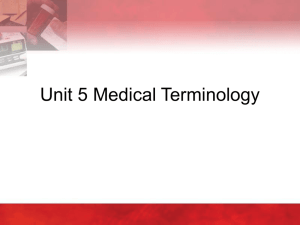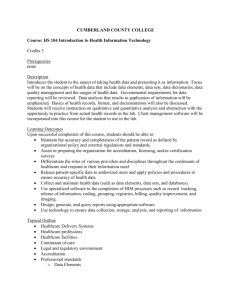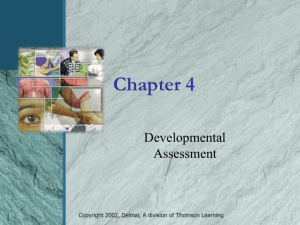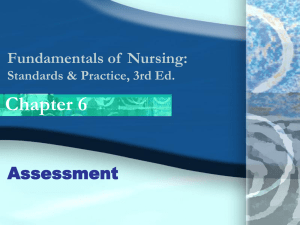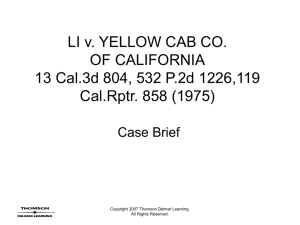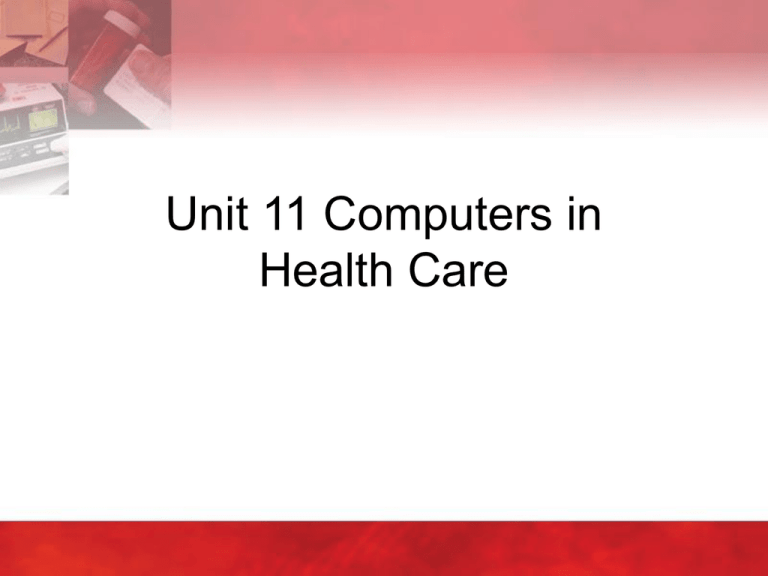
Unit 11 Computers in
Health Care
11:1 Introduction
Greatest advancement in information
processing since invention of
printing press
Use of computers a necessity in
health care
Copyright © 2004 by Thomson Delmar Learning. ALL RIGHTS RESERVED.
2
Uses in Health Care
Hospital or medical information systems
(HIS or MIS)
Diagnostic testing
Education of health care personnel
Basic and applied research: statistical
analysis of data
Copyright © 2004 by Thomson Delmar Learning. ALL RIGHTS RESERVED.
3
Computer Literacy
Ability to understand basics of how a
computer works and applications used in
your field or profession
Essential to every health care professional
Comfort in using a computer for job needs
Practice and experience in using
computers is necessary to develop
computer literacy
Copyright © 2004 by Thomson Delmar Learning. ALL RIGHTS RESERVED.
4
History of the Computer
First computers installed in late 1950s and
early 1960s
Electronic Numerical Integrator and
Computer (ENIAC)
Microchips
Sizes of computers
Copyright © 2004 by Thomson Delmar Learning. ALL RIGHTS RESERVED.
5
11:2 What is a
Computer System?
Electronic device that is a complete
information processing system
Hardware
Software
Copyright © 2004 by Thomson Delmar Learning. ALL RIGHTS RESERVED.
6
Input Devices
Information is entered into the computer
by means of an input device
Computer keyboard
Magnetic tape
Touch screen monitor
Optical scanner
Mouse
Light pen
Copyright © 2004 by Thomson Delmar Learning. ALL RIGHTS RESERVED.
7
Central Processing Unit
(CPU)
Processes all information or data entered
into the computer
Acts as the “brains” of the computer
Internal memory unit
Arithmetic and logic unit
Control unit
Copyright © 2004 by Thomson Delmar Learning. ALL RIGHTS RESERVED.
8
Output Devices
Output the finished work of the computer
Occurs after data has been processed by
the CPU
Printer
Video display
Forms of output
Copyright © 2004 by Thomson Delmar Learning. ALL RIGHTS RESERVED.
9
11:3 Computer Applications
First used to simplify accounting
procedures
Medical and hospital information system
(HIS or MIS)
Copyright © 2004 by Thomson Delmar Learning. ALL RIGHTS RESERVED.
10
Computer Uses in
Health Care
Word processing
Compiling databases
Scheduling
Maintaining financial records
Monitoring patients
Performing diagnostic tests
Copyright © 2004 by Thomson Delmar Learning. ALL RIGHTS RESERVED.
11
Computer Uses in
Health Care (continued)
Maintaining inventories
Developing spreadsheets
Communicating through modems
Copyright © 2004 by Thomson Delmar Learning. ALL RIGHTS RESERVED.
12
Examples of Uses
Admissions clerk
Physician
Pharmacist
Dietician
Laboratory technician
Nurse
Environmental service worker
Copyright © 2004 by Thomson Delmar Learning. ALL RIGHTS RESERVED.
13
Computer Uses and Issues
Hand-held portable computer
Confidentiality
Contingency backup plan essential
Copyright © 2004 by Thomson Delmar Learning. ALL RIGHTS RESERVED.
14
Computer Applications for
Diagnostics
Computer-based diagnostic tests
Analyzing blood tests
Electrocardiogram (ECG) computerized
interpretation systems
Computerized tomography (CT) scanner
Magnetic resonance imaging (MRI)
Copyright © 2004 by Thomson Delmar Learning. ALL RIGHTS RESERVED.
15
Computer Applications for
Diagnostics (continued)
Positron emission tomography (PET)
Ultrasonography
Oncology
Copyright © 2004 by Thomson Delmar Learning. ALL RIGHTS RESERVED.
16
Computer Applications
for Education
Commonplace as an educational tool
Computer-assisted instruction (CAI)
Interactive video or
computer-assisted video
Computer applications for research
Research using computer technology
Clinical researchers
Copyright © 2004 by Thomson Delmar Learning. ALL RIGHTS RESERVED.
17
11:4 Using the Internet
Network of computer users
Modem attached to computer,
telephone line, or cable lines and
specialized software
Readily connects to others
Many services and sources available
Major use in health care relates to
organ transplants
Copyright © 2004 by Thomson Delmar Learning. ALL RIGHTS RESERVED.
18
Search Engines
Defined as a database of Internet files
Engines include: search program, index,
and retrieval program
Types of search engines: crawler-based,
human-powered, mixed
Many different search engines available
Copyright © 2004 by Thomson Delmar Learning. ALL RIGHTS RESERVED.
19
Searching the Web
Must develop a strategy
Identify key words
Combine key words
Vary your search
Copyright © 2004 by Thomson Delmar Learning. ALL RIGHTS RESERVED.
20
Searching the Web
(continued)
Evaluate the source of all information
– Not all data is accurate or current
– Check source of information
– Check the credentials of the author
– Note the date of publication
– Evaluate references if listed
Health care workers can research many
topics; can be an excellent learning tool
Copyright © 2004 by Thomson Delmar Learning. ALL RIGHTS RESERVED.
21
Summary
Computers used as cost-effective and
efficient tools
Enhance quality patient care
Used for many areas of health care
Computer technology has had tremendous
impact on health care field
Copyright © 2004 by Thomson Delmar Learning. ALL RIGHTS RESERVED.
22

